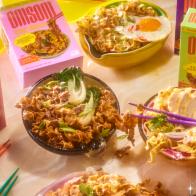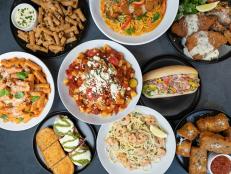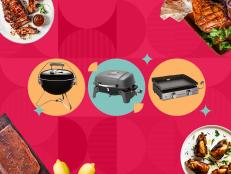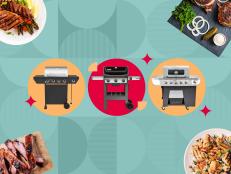How You Can Support Asian American Communities Right Now
Food industry leaders share how we can all combat anti-Asian racism.

@esze.e/Instagram
Edited by Margaret Wong & T.K. Brady
In February 2020, before the COVID-19 pandemic officially locked down the U.S., UB Preserv’s chef de cuisine Nick Wong of Houston, Texas received an odd reservation cancellation.
"We got a call on Valentine’s Day about somebody wanting to cancel Easter brunch with us, citing coronavirus. The reason was a shock to me, because none of the other major restaurants in the area fielded any calls about reservations being cancelled due to coronavirus. And me, being a Chinese-American head chef of this restaurant with a somewhat Asian menu — it was just terrible."
And just days before national shelter-in-place laws went into effect, Asian Pacific Policy and Planning Council executive director Manjusha Kulkarni found herself at a salon seated next to two women loudly discussing the "kind of food" Asians eat, and making false claims that Asian Americans brought COVID-19 to the United States.
Asian-American culture is embedded in American culture. And some of the community’s most invaluable contributions to modern society are perhaps most visible through food and dining. In 2016, it was estimated that there are 40,000 Chinese restaurants in the U.S. — nearly double the number of McDonald’s and Starbucks storefronts combined. Yet, anti-Asian racism and violence is terrorizing communities across the nation, leaving small business owners and Asian elders especially vulnerable.
According to Kulkarni, who co-founded Stop AAPI Hate, racism and hatred has shown up in multiple forms across the Asian-American community, including outward violence. Her organization receives reports of vandalism among Korean, Vietnamese and Southeast Asian restaurants, verbal comments or racist jokes, students being verbally and sometimes physically attacked and accused of having COVID, and pervasive stereotypes about Asian-American eating habits and hygiene running rampant during the COVID-19 shutdown.
"We have data that shows Chinese food is the second most delivered food in the United States," said Lucas Sin. "There's so much love for this takeout cuisine, but there’s very little love for how it’s made and the people who make it."
Sin is a chef and head of culinary arts at Junzi, a homestyle Chinese restaurant in New York. Always aware of the legacy of anti-Asian racism in the United States, he became particularly frustrated and disgusted after an ongoing series of attacks were caught on camera and gained attention on social media.
He got his restaurant involved in the #EnoughisEnough campaign, a grassroots initiative founded by Taiwanese chef Eric Sze to take action against anti-Asian sentiment. Supported by a network of several New York City food and beverage industry leaders, Sze’s campaign hosted virtual cooking classes and shared facts and history on social media to raise money and awareness to help prevent violence against Asian Americans.
"I felt pretty helpless and frustrated by my lack of voice [as a small business owner]," said Sze. "…the idea then struck me that if I strung together all these different small business owners who are sharing my same frustration, then we can maybe hopefully make a small difference."
The #EnoughisEnough initiative has raised more than $75,000 to support struggling Asian-American restaurants and businesses, deliver meals to the elderly and support charities like Send Chinatown Love, an organization supporting struggling Asian-owned businesses in NYC’s Chinatown.
"We … are grateful enough to receive part of the money that they fundraise, and we do plan to use it towards our gifts to meal campaigns in the coming months," said Marcia Hu, seller empathy lead for Send Chinatown Love. As a liaison between Send Chinatown Love and their merchants, Hu relies on social media efforts like Sze’s to help support Asian businesses owners who may not be the most social media savvy.
"It’s really special that we are in an age of social media where a regular consumer can post something, and potentially promote a business for all of the friends who follow them," said Hu. Location-tagging your favorite neighborhood spots in an Instagram post can make all the difference for a local restaurant with no Instagram account or online presence.
Chow Down Chinatown, a Houston Facebook group Wong supports, highlights small businesses and actively breaks down the mythical and racist connection between Asian food and coronavirus. "All of us in the restaurant industry, obviously have been affected pretty hugely by the pandemic and restrictions and lockdowns and things like that," says Wong. "But the Asian community out in these enclaves, it’s been affecting them since January of 2020. So it’s important to patronize those businesses, and try to support the grassroots organizations trying to help them out."
In addition to supporting small businesses and organizations, AAPI food industry leaders share how we can combat racism on a personal level.
Robert Toland, a Black and Japanese chef based in Pennsylvania, has observed and experienced different forms of racism throughout his life, from people making racist jokes around him because they didn’t immediately realize he was Asian, to seeing blatant disrespect against Asian elders. Though he’s seen some progress, he continues to be disheartened by the long, harmful legacy of portraying all Asian American communities as a monolith and how it continues today.
"I think educating yourself, reaching out to friends that are in these marginalized communities, and reading more is really important," said Toland. "I also think it’s important to look within yourself and try to, you know, sort through some of those unconscious biases."
Toland is eager to watch the food industry lead in these conversations, and to see attitudes towards AAPI communities change for the better.
In fact, Sin, Sze and a number of industry titans, are currently partnering with Washington D.C.-based Korean restaurant Anju to raise funds for Embrace Race, a non-profit organization that aims to educate children on matters of race and bias to raise a thoughtful, informed new generation.
Finally, Sahra Nguyen, owner and founder of Nguyen Coffee Supply, cites how we can all look to food to think on and begin tough conversations. Take Vietnamese coffee, for example. A simple and beloved drink can be a starting point to understanding how racism has functioned in the coffee industry.
Nguyen uses coffee as an access point to educate communities on anti-Asian racism. And through her business, she offers one solution: by offering ethically-sourced coffee beans that illuminate and celebrate the people who cultivate them.
"We’re going to do more than just push a product, we want to use this opportunity to talk more about these issues and how we’re all living and interacting with each other," she says.
From where we source our food, and how we talk about that food, matters. And one way to dismantle harmful systems is to shop and eat consciously.
Though the fight against anti-Asian racism continues, researchers and food industry leaders are encouraged by the outpouring of support for their efforts and believe that food will be a helpful tool in shifting attitudes and behaviors.
"We’re gonna have to change hearts and minds," said Kulkarni. "And what better way to do that, than through food?"
Editor’s Note: Historically, and for the past year, this week especially, we have witnessed a horrifying pattern of anti-Asian racism in the form of disturbing rhetoric, harassment and violence. In addition to the causes listed in this article, there are a number of organizations working to support the AAPI community. You can learn more about them here and here.
Related Content:































































